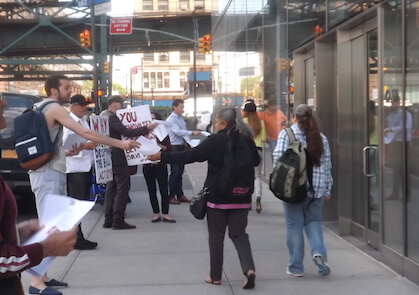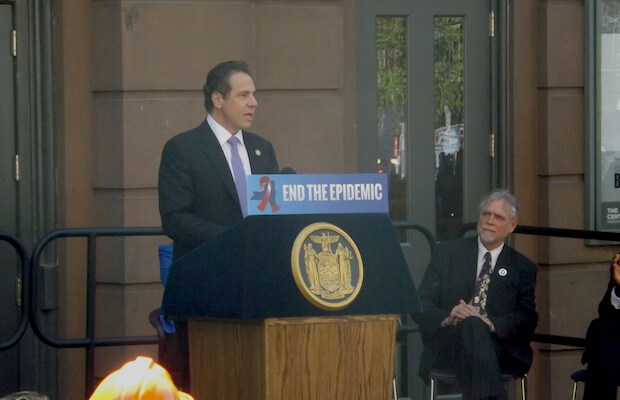Dr. Edward Fishkin, the chief medical officer at NYC Health + Hospitals/ Woodhull (center), receives a 2018 Gay City News Impact Award, presented by Brooklyn City Councilmember Stephen Levin on April 26 at the Grand Prospect Hall in Park Slope. | DONNA ACETO
Last summer, when NYC Health + Hospitals/ Woodhull opened its Pride Health Center focused on the needs and disparities facing the LGBTQ community, it became the first facility focused on the specific needs of queer New Yorkers living in North Brooklyn. Woodhull, a public hospital that serves patients regardless of their ability to pay, is located on Flushing Avenue near the Broadway Triangle area that straddles Williamsburg and Bushwick.
As both outside objective measures and Woodhull’s chief medical officer, Dr. Edward Fishkin, attest, the Pride Health Center did not emerge out of nowhere. Since 2014, Woodhull has been rated a Leader in LGBTQ Healthcare Equality by the Human Rights Campaign, meaning it achieved a perfect 100 percent on the group’s semi-annual Healthcare Equality Index. That index looks at specific policies and practices regarding non-discrimination and staff training; patient services and support; employee benefits and policies; patient and community engagement; and responsible citizenship. Out of more than 1,600 health institutions ranked in 2018, only 418 were judged Leaders; and that number was smaller four years ago when Woodhull won its 100 percent rating.
But, in Fishkin’s telling, fulfilling a public hospital’s mission to serve the “whole community” is a matter of constantly “peeling the onion” to better understand the needs of a particular part of the city. As the hospital focused on its delivery of services to LGBTQ patients, it recognized the disparities that queer North Brooklynites faced relative to their peers living in Manhattan. The density of primary care physicians in the neighborhoods of Brooklyn that Woodhull serves, Fishkin pointed out, is between one-tenth and one-twentieth of that on the Upper West and Upper East Sides. With fewer primary care options, the chances of an LGBTQ person finding a doctor culturally attuned to their needs are dramatically reduced.
Woodhull’s Pride Health Center offers services tailored to the LGBTQ community
Nor did North Brooklyn have any facility to rival the Callen-Lorde Community Health Center that for decades has provided LGBTQ care regardless of the ability to pay in Chelsea.
The overall community needs assessment that Woodhull completed led Fishkin several years ago to propose an outpatient clinic specifically focused on the queer community. The idea, he said, was greeted enthusiastically by staff and given a major boost when Gregory Calliste was named the hospital’s CEO in 2016. In addition to drawing on internal expertise at Woodhull, Fishkin also brought in outside experts, such as Liz Margolies, a psychotherapist with decades of achievement in LGBTQ healthcare delivery, first as the coordinator of the Lesbian Cancer Initiative and more recently as founder of the National LGBT Cancer Network.
The facility, which currently operates from 4 to 8 p.m. on Mondays and by appointment, aims to deliver “virtually everything” — from primary care and sexual health services, including gynecological care, to mental health and ophthalmological care — “under one roof.” The outpatient clinic is staffed by two nurse practitioners and can call on two endocrinologists to serve the needs of transgender patients.
Fishkin has a proven track record at Woodhull in delivering innovative community health services. Since 1995, his Colon Cancer Screening Program has quadrupled the number of colonoscopies for North Brooklyn residents, and his Attack Back Program focused on endemic asthma in the community has reduced adult and pediatric ER visits and hospitalizations for asthma by 70 percent. Fishkin is also engaged on the ground in the community, having led bike rides with local youth, teens, and their parents for the past 23 years to encourage physical fitness.
At the launch of Woodhull’s Pride Health Center last year, Dr. Edward Fishkin is joined by Assemblymember Maritza Davila, First Lady Chirlane McCray, Gregory Calliste, the hospital’s CEO, and patient Dovear Calhoun. | ED REED/ MAYOR’S OFFICE
With nearly a year under his belt with the Pride Health Center, he plans to engage local LGBTQ organizations to educate them about the health care opportunities at Woodhull. Hospital staff have been in dialogue for months with the Brooklyn Community Pride Center, which recently opened its new home on Fulton Street in Bedford-Stuyvesant. Fishkin also hopes to expand the facility’s services to include adolescent and pediatric care.
In its first year of operation, Woodhull’s Pride Health Center has served roughly six patients each Monday evening session. Most patients are seeking primary care, with many of them having earlier experienced doctors unaware of what their insurance options might be. About one third of all patients to date are HIV-positive, and many of them came from doctors who were unfamiliar with the state’s AIDS Drug Assistance Program, which provides needed anti-HIV medications to uninsured and underinsured New Yorkers with incomes too high to qualify for Medicaid. Woodhull has been successful in getting most of those patients lacking insurance coverage since their first visit.
The bulk of the first year’s patients, Fishkin said, have been gay men, though he emphasized that the facility is prepared to provide the full range of services for transgender patients and, especially in light of the know-how Margolies provided in consulting on the effort, is also equipped to meet the unique needs of lesbian patients.
Among those HIV-negative gay and bisexual men who have visited the Pride Health Center, he said, most have been “very receptive” to considering the use of PrEP, which when used daily reduces the risk of HIV infection to virtually zero. PrEP is among the behavioral interventions that advocates and the state and the city are relying on to achieve the goal of ending AIDS as an epidemic in New York by 2020.




































